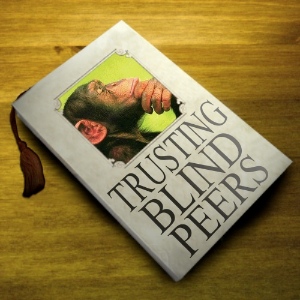Why peer-review is flawed.
 Although I’m still yet to have an academic article published, I’ve made a public commitment to do so only in open-access journals. I’ve already dedicated this blog to the public domain (see CC0 license in footer) and shared my thesis online. Whilst for me it’s a logical continuation of my position as an open educator/academic/researcher/individual, I’ve been waiting for a compelling reason for others to ditch closed journals.
Although I’m still yet to have an academic article published, I’ve made a public commitment to do so only in open-access journals. I’ve already dedicated this blog to the public domain (see CC0 license in footer) and shared my thesis online. Whilst for me it’s a logical continuation of my position as an open educator/academic/researcher/individual, I’ve been waiting for a compelling reason for others to ditch closed journals.
In this, my third blog post quoting Zygmunt Bauman (from a recent interview with Simon Dawes, editor of Theory, Culture & Society), I want to consider briefly the ways in which the whole edifice of the peer-review system is flawed. It’s not just about the binary distinction between whether a journal is ‘open’ or ‘closed’.
Simon Dawes: One final question, TCS is committed to the process of peer-review, and many of our (both rejected and accepted) contributors are grateful for the feedback given by our editors and anonymous reviewers, and for the subsequent strengthening of their articles, but you are critical of peer-review and no longer act as a referee for us. Could you tell us why?
Zygmunt Bauman: There are, by the most conservative counting, two grave and deeply regrettable collateral victims of the peer-review gruesome strategem: one is the daring of thought (wished-washed to the lowest common denominator), and the other is the individuality, as well as the responsibility of editors (those seeking shelter behind the anonymity of ‘peers’, but in fact dissolved in it, in many cases without a trace).
…
Last but not least, I would single out yet another collateral damage: the multitude of the trails blazed and heterogeneity of inspirations. I suspect that the peer-review system carriers a good part of blame for the fact that something like 60 percent or more of journal articles are never quoted (which means leaving no trace on our joint scholarly pursuits), and (in my reception at any rate) the ‘learned journals’… ooze monumental boredom. To find a new enlightening and inspiring idea (as distinct from finding a recipe for getting safely through the peer-built barricade), browsing through thousands of journal pages is all too often called for. With my tongue in one cheek only, I’d suggest that were our Palaeolithic ancestors to discover the peer-review dredger, we would still be sitting in caves…
That’s a fairly damning verdict from an Emeritus Professor of Sociology, don’t you think? I haven’t met anyone who thinks that the REF (Research Excellence Framework) is a good idea and does the job it’s intended to do. The ‘peer-built barricade’ that Bauman mentions evolved in a world before real-time communication between academics; although it feels obvious to say so, the internet changes everything. As proved with <a href="my thesis (see Appendix 3) the amount and quality of feedback does not depend either upon journals or anonymity. We can, and should, build a better (more democratic, fairer, transparent) system.
Image CC BY-SA Gideon Burton
